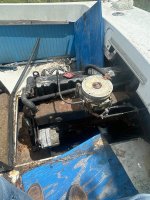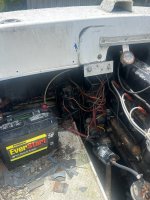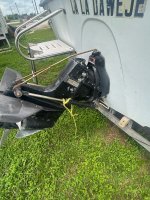I have a line on an old V-20 close to me in Texas. Actually it is from a family member. It has been sitting forever. I think it is a 1975. My great-uncle kept this boat at his lake house. He was a Navy vet and mechanic by trade and he always kept things very meticulously. All titles, manual, etc are with the boat.
From what I am reading these boats are pretty popular. This one has been sitting for a long time. It definitely needs to be washed, but my cousin says there are no soft spots and it looks pretty decent from what I am seeing in pics.
Yes, it is a 50 year old boat. Yes, I have a boat problem (2 old 1969 38' + sailboats, and have had others over the years). It's dirt cheap and the galvanized trailer is in excellent shape which is probably worth twice what I would be paying for the boat.
What would you guys look for when taking a look at it?
What steps would you take to try fire up the old motor? Other than thorough clean I am thinking: new battery, check/change oil/filter, use external tank (until I drain and clean the 2 deck mounted aluminum tanks), visually inspect wiring, see if she turns freely, have fire extinguisher on hand and see If I can get a crank. Determine how to run water and try to start - check for proper water flow.
Am I on the right track?
From what I am reading these boats are pretty popular. This one has been sitting for a long time. It definitely needs to be washed, but my cousin says there are no soft spots and it looks pretty decent from what I am seeing in pics.
Yes, it is a 50 year old boat. Yes, I have a boat problem (2 old 1969 38' + sailboats, and have had others over the years). It's dirt cheap and the galvanized trailer is in excellent shape which is probably worth twice what I would be paying for the boat.
What would you guys look for when taking a look at it?
What steps would you take to try fire up the old motor? Other than thorough clean I am thinking: new battery, check/change oil/filter, use external tank (until I drain and clean the 2 deck mounted aluminum tanks), visually inspect wiring, see if she turns freely, have fire extinguisher on hand and see If I can get a crank. Determine how to run water and try to start - check for proper water flow.
Am I on the right track?



